Career Development Award Gives Junior Faculty a Boost
Since 2014, the award has given faculty conducting research tools to advance their career through funding, salary support and collaborative opportunities.
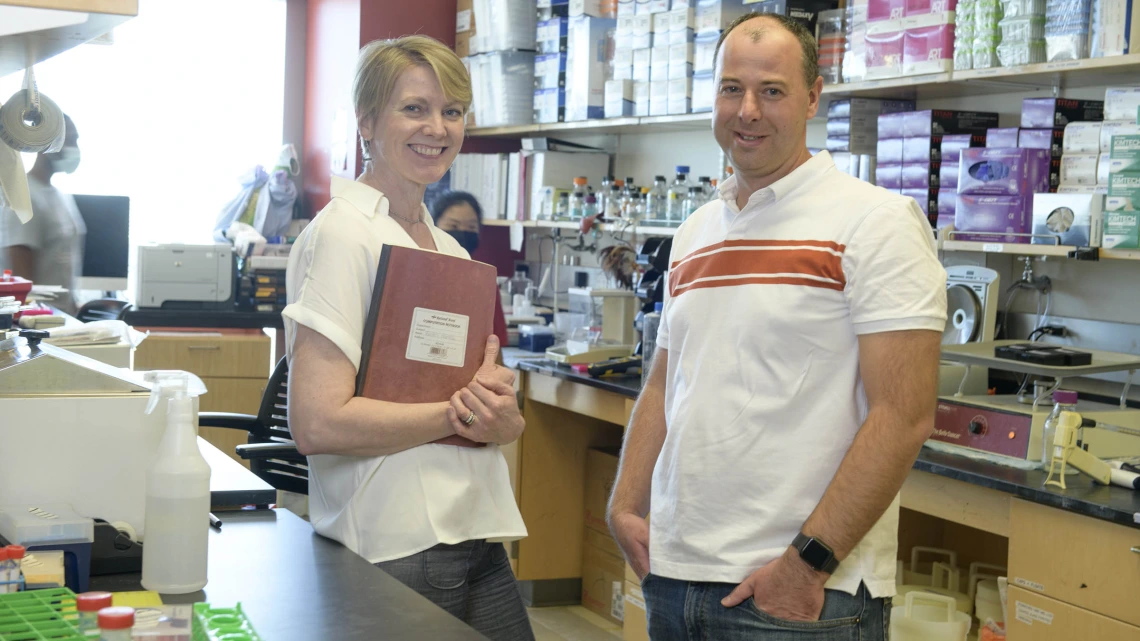
John Purdy, PhD, (right) assistant professor of immunobiology at the College of Medicine – Tucson, was a Career Development Award recipient in 2016 and was mentored by Felicia Goodrum, PhD, professor of immunobiology at the College of Medicine – Tucson.
For junior faculty, finding a way to get a leg up on research and career advancement can be difficult. Between teaching, working with graduate students and trying to complete their own research, there are many obstacles on the road to success. But a program the University of Arizona Health Sciences started in 2014 helps give early career researchers the boost they need.
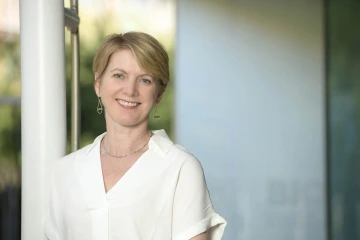
Felicia Goodrum, PhD.
The Career Development Award program (CDA) provides research training and funding through the Office of the Senior Vice President for Health Sciences and the College of Medicine - Tucson. The extra boost of support empowers award recipients to ask daring questions, engages them in wide-ranging collaborations, and can be a springboard to larger grants that fund follow-up research that defines their career trajectories.
“Since it began, the program has supported some of the most successful researchers at the University of Arizona Health Sciences,” said Lauren Zajac, MPA, associate vice president for research administration for Health Sciences. “I’m very thankful to Health Sciences Senior Vice President Dake, and Dean Abecassis from the College of Medicine – Tucson, as they have both provided a tremendous amount of support for the program.”
The award provides mentorship, research training and salary support, plus funding for travel and research supplies. The CDA scholars must complete an independent research project, which is expected to generate sufficient pilot findings to enable the submission of a National Institutes of Health (NIH) K-series or R01 grant (or equivalent) by the second year of the program. This support can be just what junior faculty need to elevate their career to the next level.
A protected time to focus
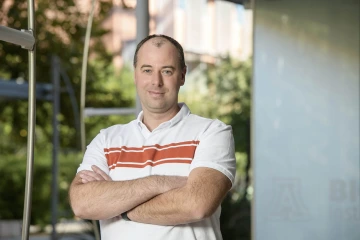
John Purdy, PhD.
In 2016, John Purdy, PhD, assistant professor of immunobiology at the College of Medicine – Tucson and member of the BIO5 Institute, was selected as a CDA scholar, which gave him a budget to hire additional lab workers, along with “protected time” – guaranteed time to focus on research that he says was essential for developing new methods for conducting his research.
“Protected time is critical for us to think of new ideas and pick up on things that nobody has observed before,” Dr. Purdy said. “Science is a very creative process, but we can’t be creative when we’re not able to think about our research, when we’re in a bunch of meetings or in class teaching. That creative process is what keeps me in science.”
Zajac says this protected time is one of the most important aspects of the CDA, possibly surpassing the monetary value of the award itself.
“With the academic pressures of being a junior faculty member, it is very easy to have your time overtaken by clinical obligations, teaching obligations, administrative obligations,” Zajac said. “This grant buys 75% of your time to focus on research. The administrative burden of being a scientist is huge, so it’s amazing to shield them from spending an excessive amount of time on other commitments.”
A training ground for mentorship
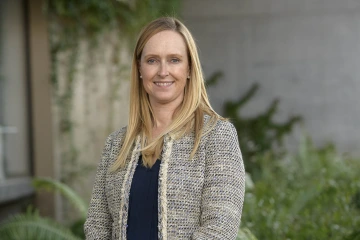
Katri Typpo, MD, division chief of Pediatric Critical Care at the College of Medicine – Tucson.
Each scholar also must choose a lead mentor, or mentors if the project is multidisciplinary. Dr. Purdy was paired with Felicia Goodrum, PhD, professor of immunobiology at the College of Medicine – Tucson.
“It’s really rewarding to see him grow as a scientist, and to see his confidence grow,” said Dr. Goodrum, who also is a member of BIO5 and the UArizona Cancer Center. “It’s rewarding to see scientists find their own stride and come into their own. It’s super rewarding when you see them taking on this independent ability to get the funding to tackle science on their own.”
“Having her as a resource to help me manage the whole process, the good parts of the process and the bad parts of the process, has been really essential,” Dr. Purdy added. “I’ve had a really strong network that’s included Felicia.”
On the other end of the College of Medicine – Tucson is the Department of Pediatrics, headed by Department Chair Fayez Ghishan, MD, director of the UArizona Steele Children’s Research Center and an accomplished physician-scientist. He mentored Katri Typpo, MD, division chief of Pediatric Critical Care at the College of Medicine – Tucson, who was a member of the first cohort of CDA recipients. She says Dr. Ghishan’s guidance allowed her to blossom from a clinician into a physician-scientist.
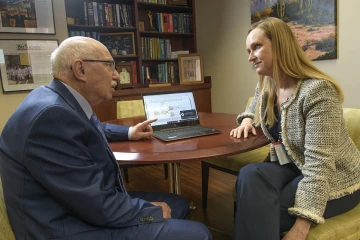
Fayez Ghishan, MD, chair of the College of Medicine – Tucson Department of Pediatrics and director of the UArizona Steele Children’s Research Center, mentors Katri Typpo, MD.
“I will always be able to go to Dr. Ghishan for advice,” said Dr. Typpo, who also is the attending intensivist at Banner – University Medical Center Tucson and Diamond Children’s Medical Center. “The mentor-mentee relationship changes as you go from CDA awardee to independently funded investigator. Early on our conversations were focused on experimental details, whereas now we focus on big-picture career development.”
Dr. Ghishan takes pride in working with clinicians and teaching them how to do research. He cites Dr. Typpo as an example of a doctor expanding her skills beyond the bedside.
“This is a physician who transformed to become a physician-scientist, taking what we initially did together to the next level. All of a sudden, she is a highly respected investigator in her own right,” Dr. Ghishan said. “We can move clinicians directly to basic science to make them physician-scientists.”
A springboard to grants
For both Drs. Purdy and Typpo, the CDA was a springboard to several subsequent NIH grants that supported larger and more robust studies.
“It really helped me formulate the ideas. It helped me practice writing grants to prepare for those big NIH grants,” Dr. Purdy said.
“Without it, I wouldn’t have had the dedicated time to sit with Dr. Ghishan, work in the lab and generate the pilot data, which has been the launching pad for the rest of my research career,” Dr. Typpo added. “Without that support, I wouldn’t be where I am right now.”
As he mentored her throughout the CDA project and beyond, Dr. Ghishan watched as Dr. Typpo quickly learned to put together highly scored grant applications, mentioning that after completing the CDA, she received one of the highest scores possible on her subsequent K award application to the NIH.
“We got a score of 2 on a scale of 1 to 9, with 1 being exceptional, which is a spectacular score,” he recalled. “Then we submitted an R01 grant, which is the ultimate in science. The first time ever, she scored in the sixth percentile in the whole country. Now she collaborates with many centers around the country doing clinical trials. She goes from one grant to another grant to a third grant to a fourth grant!”
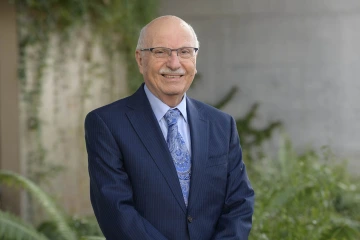
Fayez Ghishan, MD.
“Scientists are trained in the art of science, not in the art of grant writing. It’s an art, this game of applying for funding and telling a story that is compelling to people reviewing those grants,” Dr. Goodrum said, adding that Dr. Purdy has received numerous subsequent grants to continue his research, including two R01 grants from the NIH. “Opportunities like the CDA give him that experience, and he can focus on his science rather than on the anxiety around getting funding.”
Dr. Goodrum says support for scientists early in their careers empowers them to take bigger risks, potentially propelling them to greater heights. By supporting researchers early in their careers, the CDA sets them up for success and teaches them the ropes of the research landscape.
“Internal funding opportunities like the CDA bolster their success and their confidence, and spur getting more grants,” Dr. Goodrum said. “It definitely helps propel things forward, and it gives researchers a bit of a buffer to take more risk because they have that extra funding, so they can ask some of the more far-reaching questions -- and make the bigger leap to get that bigger reward.”
“The best thing ever done here is establishing the CDA to advance and propagate knowledge,” Dr. Ghishan added. “All I need to do with this life is bring in more people in the pipeline and make the University of Arizona Health Sciences a shining light for advancing knowledge in this country.”
Applications for the 2022 class are due Feb. 1, and recipients will be announced in March 2022. For more information and to apply, please click here.
Previous Health Sciences CDA Recipients:
2014
- Christine E. Berry, MD, “The Impact of Early Life Exposures on Lung Function Trajectory: Childhood Origins of COPD,” College of Medicine – Tucson. Mentor: Fernando Martinez, MD.
- Christian Bime, MD, “Genetic and Non-Genetic Contributors to ARDS Outcomes,” College of Medicine – Tucson. Mentor: Sairam Parthasarathy, MD.
- Pavani Chalasani, MD, “Optimizing AcidoCEST MRI as a Novel Method for Measuring Tumor pH in Breast Cancer Patients,” College of Medicine – Tucson. Mentor: Mark D. Pagel, MD.
- Ankit A. Desai, MD, “Sudden Death and Sickle Cell Disease – An Electrophysiological and Molecular Investigation,” College of Medicine – Tucson; Mentor: Joe G.N. “Skip” Garcia, MD.
- Francine C. Gachupin, PhD, “American Indian Youth Wellness Initiative,” College of Medicine – Tucson. Mentor: Scott B. Going, PhD.
- May Khanna, PhD, “Designer Drugs for Chronic Pain: Indirect Targeting of Nav 1.7,” College of Medicine – Tucson. Mentor: Todd Vanderah, PhD.
- Amol Patwardhan, MD, PhD, “Intraoperative TRPV1 Antagonist for Treatment of Hypothermia and Postoperative Pain,” College of Medicine – Tucson. Mentor: Frank Porreca, PhD.
- Katri Typpo, MD, “Intestinal Barrier Function and Post Operative Enteral Nutrition for Children with Congenital Heart Disease,” College of Medicine – Tucson. Mentor: Fayez K. Ghishan, MD.
2015
- Archita Desai, MD, “The Hospitalist-based Health-care Delivery Model in Cirrhosis: Closing the Quality Chasm,” College of Medicine – Tucson; Mentors: Elizabeth Calhoun, PhD; Thomas Boyer, MD.
- Michelle Kahn-John, PhD, RN, “Depression in Diné (Navajo) Adults who Participate in the Diné Hochxoiji (Navajo Evil Way) Ceremony,” College of Nursing. Mentors: Thaddeus. Pace, PhD; Marylyn McEwen, PhD; Terry Badger, PhD, RN.
- Wei-Hsuan Jenny Lo-Ciganic, PhD, “Using Machine Learning to Predict Problematic Opioid Use,” R. Ken Coit College of Pharmacy. Mentors: C. Kent Kwoh, MD; Daniel Malone, RPh, PhD.
- Jarrod Mosier, MD, “Acute Respiratory Distress Syndrome Rescue Therapies and Oxidative Stress, College of Medicine – Tucson. Mentor: Charles Cairns, MD.
- Eyal Oren PhD, “Assessing the Relationship Between Childhood Stress and Asthma,” Mel and Enid Zuckerman College of Public Health. Mentor: Lynn Gerald, PhD, MSPH.
- Olga Rafikova, MD, PhD, “HMGBI and Gender Difference in Pulmonary Arterial Hypertension,” College of Medicine – Tucson. Mentors: Stephen M. Black, PhD; Ankit Desai, MD.
- Megan Smithey, PhD, “Defining Immune Control of Human Cytomegalovirus over the Lifespan,” College of Medicine – Tucson. Mentor: Janko Nikolich-Zugich, MD, PhD.
2016
- Charles Downs, PhD, “RAGE-Induced Changes in the Proteome of the Alveolar Epithelium,” College of Nursing. Mentors: Stephen M. Black, PhD, Joe G.N. “Skip” Garcia, MD.
- David Garcia, PhD, “The Influence of Genetic Variants and Metabolite Profiles on Responses to a Weight Loss Intervention for Hispanic Men,” Mel and Enid Zuckerman College of Public Health. Mentors: Cynthia Thomson, PhD; Kenneth Ramos, MD, PhD.
- Craig Heise, MD, “Evaluation of an Electronic Medical Record-Based Clinical Decision Support System in a Large Healthcare System to Improve Antibiotic Safety: A Cluster Randomized Intervention Trial,” College of Medicine – Phoenix. Mentor: Raymond Woosley, MD, PhD.
- Jason Karnes, PhD, PharmD, “Warfarin Pharmacogenomics in Latino Populations,” R. Ken Coit College of Pharmacy. Mentors: Rick Kittles, PhD; Kenneth Ramos, MD, PhD.
- John Purdy, PhD, “Targeting Host Metabolism During Cytomegalovirus Infection,” College of Medicine – Tucson. Mentor: Felicia Goodrum, PhD.
- Elsa Reyes-Reyes, PhD, “Defining L1 as a Molecular Target for Clinical Translation in Lung Cancer Research,” College of Medicine – Tucson. Mentor: Kenneth Ramos, MD, PhD.
2017
- Nancy Casanova, MD, “Novel molecular-based biomarkers and potential molecular therapeutic targets in sarcoidosis,” College of Medicine – Tucson. Mentor: Joe G.N. Garcia, MD.
- Gloria Guzman Perez-Carrillo, MD, MSc, “Diffusion basis spectrum imaging with extended isotropic spectrum (DBIS-ELS) for tumor diagnosis,” College of Medicine – Tucson. Mentors: Andrew Karellas, PhD; Diego Martin MD, PhD.
- Michael D.L. Johnson, PhD, “Bacterial interaction with copper: New strategies and therapeutic targets to combat pathogens,” College of Medicine – Tucson. Mentor: Magdalene So, PhD.
- Julio C. Rodriguez, PhD, “Using MRI can increase the specificity of 18F-FDG-PET to detect lung tumors,” College of Medicine – Tucson. Mentors: Julie E. Bauman, MD; Ali Bilgin, PhD.
- John M. Streicher, PhD, “Monoamine Transporter and Buprenorphine in Reducing Buprenorphine Analgesia,” College of Medicine – Tucson. Mentor: Todd W. Vanderah, PhD.
2018
- Daniel Combs, MD, “Obstructive sleep apnea, neuro- cognition and quality of life in children with congenital heart disease,” College of Medicine – Tucson. Mentor: Sairam Parthasarathy, MD.
- Tracey Crane, PhD, MS, RDN, Exploring the role of circadian rhythm disruption in ovarian cancer progression and using machine learning to design precision lifestyle interventions,"College of Nursing. Mentors: Sairam Parthasarathy, MD; Nirav Merchant.
- Belinda Sun, MD, PhD ,“Novel Biomarkers and Therapeutic Targets in Prostatic Cancer Progression,” College of Medicine-Tucson. Mentors: Joe G.N. “Skip” Garcia, MD ; Anne Cress, PhD.
- Craig Weinkauf, MD, PhD “Immune Mechanisms of Carotid Plaque Instability,” College of Medicine – Tucson. Mentor: Irving Kron, MD.
2019
- Darren Cusanovich, PhD, “Single-cell Profiles of Lung Aspirates from Patients at Risk of Bronchopulmonary Dysplasia: A Molecular View of the Response of the Lung to Medical Intervention in Preterm Infants,” College of Medicine – Tucson. Mentors: Fernando D. Martinez, MD; Mohamed N. Ahmed, MD.
- Lindsay Kohler, PhD, “Patient-centric assessment of renal nutrition in diabetic patients: developing a new technology,” Mel and Enid Zuckerman College of Public Health. Mentor: Lawrence Mandarino, PhD.
- Salma Patel, MD, MPH, “The Impact of Genetic QT score on Mortality in Patients with Obstructive Sleep Apnea Progression,” College of Medicine – Tucson. Mentor: Sairam Parthasarathy, MD.
- Nahla Zaghloul, MD, PhD, “Neuro-protective role of Allopregnanolone in neonatal white matter brain injury,” College of Medicine – Tucson. Mentors: Roberta D. Brinton, PhD; Fayez K. Ghishan, MD.
2020-21
- Andreia Zago Chingnalia, PharmD, PhD, “Glypican 1 and pulmonary complications from heart failure,” College of Medicine – Tucson. Mentor: Stephen Black, PhD.
- Chris Lim, PhD, “Application of Sensor Systems to Examine Exposure-Response Relationship between Air Pollution and Asthma Symptoms in Tucson Schools,” Mel and Enid Zuckerman College of Public Health. Mentors: Lynn Gerald, PhD, MSPH; Paloma Beamer, PhD; Dean Billheimer, PhD.
- David Tzou, MD, MPH, “Urinary Stone Endotoxin and its Cellular Impacts: Considerations for Sepsis,” College of Medicine – Tucson. Mentor: Gayatri Vedantam, PhD.
- Amanda Wilson, PhD, MS, “Healthcare workers’ asthma and infection risk-risk tradeoffs from cleaning and disinfection activities,” Mela dn Enid Zuckerman College of Public Health. Mentors: Paloma Beamer, PhD; Rachel Jones, PhD, CIH; Lynn Gerald, PhD, MSPH; Judy LaKind, PhD; Frank Drews, PhD.

